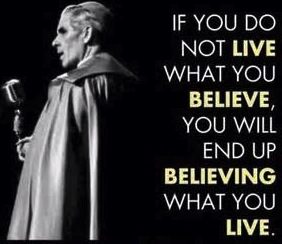Readings for the Second Sunday in Advent: Isaiah 11:1-10; Psalm 72; Romans 15:4-9; Matthew 3:1-12
"Repent, for the kingdom of heaven is at hand." (Matthew 3:2)
Repent. It is a word we don't hear much these days. Our secular society tell us that the only evils one needs repentance from are heinous crimes like rape and murder, and, increasingly, whatever form of bigotry or "ism" one is accused of. As long as you're not harming someone else, anything else is fair game, so we are told. Live your life however you want. Sin is no big deal, if there even is such a thing. Sadly, we too often don't hear a much different message in our parishes on Sunday.
But as today's readings show, such a view stands in direct opposition to the Gospel. For in order to make way for Jesus and announce his imminent coming, John the Baptist tells everyone who would listen to repent. It is no coincidence that his warning is almost identical to Jesus's first public words: "the kingdom of God is at hand; repent, and believe in the gospel." (Mark 1:15) And John the Baptist doesn't beat around the bush or sugar coat the message either. He called the Pharisees and Sad'ducees a "brood of vipers" and told them not only to repent, but to "bear fruit" as evidence of such repentance. Like many Jews of that time, the Pharisees and Sad'ducees thought that just because they were descendants of Abraham, they were assured salvation. Nothing else mattered; no repentance was necessary. Yet John shatters their self-assurance, warning them not to "presume to say" to themselves "we have Abraham as our father," and that "every tree . . . that does not bear good fruit [will be] cut down and thrown into the fire." (Matthew 3:9-10)
What does this mean for us as Christians? Like the Pharisees and Sad'ducees John admonished, it is sometimes easy for us to get complacent in our walk with Christ. We check all the boxes of our faith, do the bare minimum, and think we are good. As long as we aren't one of those really bad "sinners" we hear about on the evening news, no real repentance is necessary. At least that's what I try to tell myself sometimes. But that is a far cry from the repentance and radical holiness that Jesus us calls us to. "Be perfect, as your heavenly Father is perfect." (Matthew 5:48) Because as John tells us, Jesus, with "winnowing fork in his hand . . . will clear his threshing floor and gather his wheat into the granary, but the chaff he will burn with unquenchable fire." (Matthew 3:12)
Advent is a time of preparation and repentance. And Jesus left us the Sacrament of Reconciliation for that very repentance. His mercy is inexhaustible, and like the father of the prodigal son, He waits looking for us, eager to run and embrace us at first sight. All we have to do is take the first step towards Him. So, as we enter the second week of Advent, let us repent, bear fruit, and in so doing, "with one voice glorify the God and Father of our Lord Jesus Christ." (Romans 15:6)
God love you.

